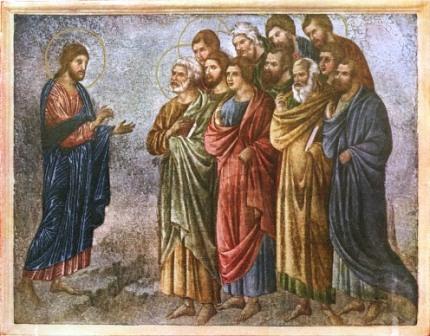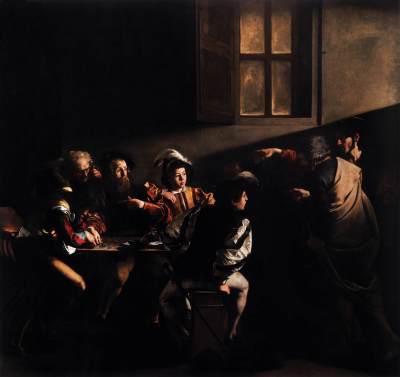Amos 7:12—15
Psalm 85
Ephesians 1:3-18
Mark 6:7—13
Why am I here? What am I for? Is it a good thing that I exist? If so, why? One does not need to practice a faith to have and explore these sorts of “big picture questions” about one’s identity and value as an individual. Such questions are certainly at the root of faith, which helps to supply answers to them that then serve to orient and motivate one’s life.
In the Epistle for this Sunday, St. Paul provides a very concise answer to the question of why we’re here and what we’re for: “In him we were also chosen, destined in accord with the purpose of the One who accomplishes all things according to the intention of his will, so that we might exist for the praise of his glory.”
Do you ever have “zone out” moments with St. Paul, when your eyes kind of glaze over and you go on autopilot, waiting for a cue to bring you back? I think for most of us the passage I just quoted from Paul’s Letter to the Ephesians has qualified at some point as one of those places where you’re just not sure what is going on in the Apostle’s mind. Perhaps it’s just pious filler. Perhaps it’s a poetic rapture. Either way, it often just passes right over.
But this little line is different, I would submit. It tells us, after all, what we should exist for. That’s pretty important. So what’s the answer? St. Paul says here that the activity for which we should exist is praise. That’s interesting for two reasons.
First of all, because it does not seem to relate directly to any power, skill or attribute of my own that would indicate the sorts of accomplishments of which I myself am capable. Rather, Paul seems to imply that my purpose for existing is fundamentally rooted in my relationship to another. Secondly, the goodness of this defining relationship arises from my own apprehension and articulation of the goodness of another. So the meaning of my existence ultimately rests in the meaning I see in something else. How peculiar, if you think about it.
The meaning we see in this other is a specific kind of goodness, however: glory. What is glory, after all? It’s hard to use that word unironically these days. What is it for something to have or embody glory? We could readily come up with synonyms of this term Paul uses (doxa): splendor, magnificence, majesty, worth, excellence, preeminence, dignity. The corresponding Hebrew word refers primarily to weight or heaviness, something’s intrinsic value.
To praise the glory of something is to endorse and affirm that something possesses a form of goodness that exceeds a boundary. To congratulate someone for getting a perfect score on a test is to affirm a certain kind of goodness, but one that is bounded by a defined limit. To say something or someone is glorious is to say more: they do not merely meet a certain set of requirements or fulfill certain prescribed criteria; they go beyond them, expanding one’s very sense of what is possible. So it is with God. He is good not because He is the maximum on some ontological scale, or the terminus of some hierarchical chain. So why is He good? In what then does His glory consist?
The readings for today seem to connect the praise for which we exist with the mere act of God’s choosing. “The Lord took me,” says Amos, to prophesy to Israel. “We were chosen,” St. Paul says (repeatedly): “He chose us.” Just as He chose the twelve, whom He instructs in the gospel reading to go out to the people, minister to them, and drive out demons.
But why is such choosing glorious? Yes, I suppose you could give a highly conceptual answer about God being the source of all goodness and thus determining through His sovereign will all manifestations of goodness in creation. But the answer is simpler, I think: the glory of being chosen is the glory of being loved. It is the glory of being seen and embraced for who one is and who one was created to be.
To exist for the praise of His glory is thus to affirm one’s “chosenness” by choosing others as we have been chosen, drawing them into the love that chose us. The paradox at the heart of this glory is that God’s choosing of each one of us is utterly unique and isolated, and yet something that applies to everyone. The key to this paradox is that such an act of loving choice is the reason that each one of us (and indeed, every created thing) exists in the first place.
To exist for the praise of His glory is simply to say, “yes, you made me; you chose me to be who I am.” Yet it is also to profess and live out the truth of this glory in everyone we see, even and especially the last, the least and the lost among us. To see the outcast, the loner, the oppressed, and somehow to embrace them for who they are, not because that’s what our “religion” prescribes but because that’s what we actually see and want to do: that is to exist for the praise of His glory.
Let’s face it: the disciples were nothing special, and neither are we; neither was that “rich young ruler” Jesus encountered. Yet the same fundamental, transformative truth applies to us all: He looked upon us, and loved us. That right there—“you looked upon me, and loved me”—is the truth that unlocks the ultimate meaning and value of everyone’s existence. To simply say “yes” and “thank you,” and then live out those convictions, is truly to “exist for the praise of His glory.”





